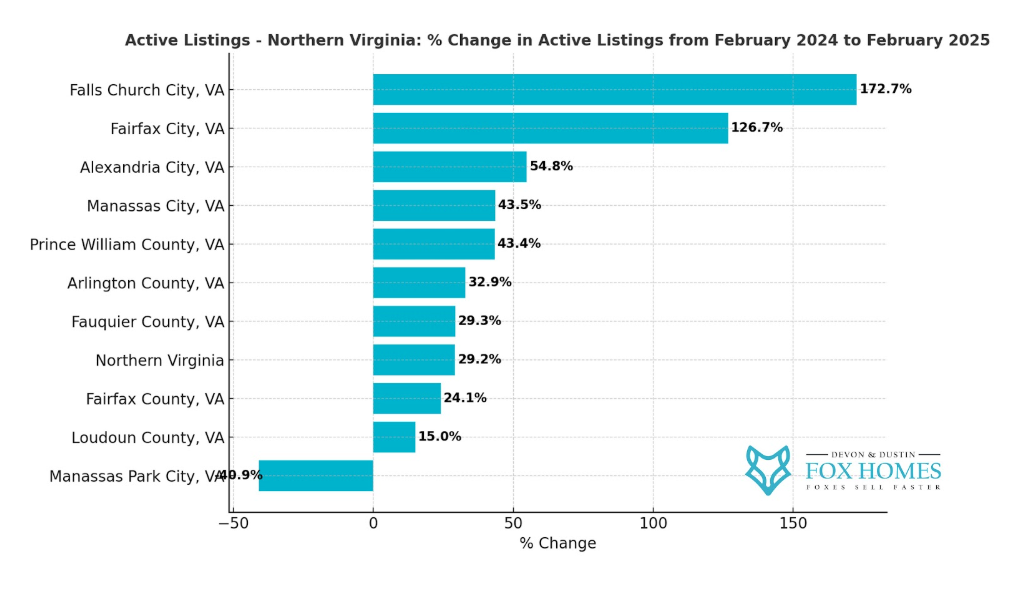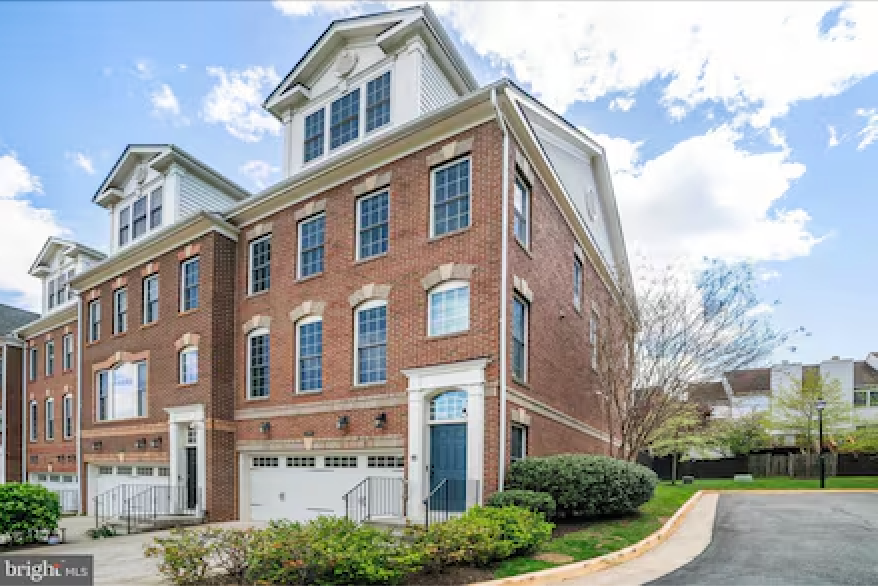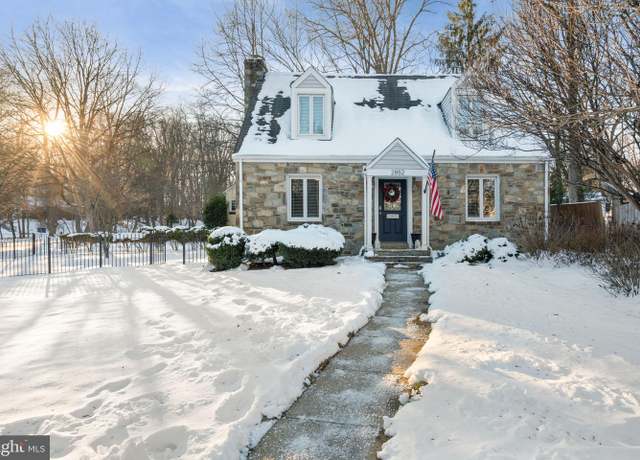Real Estate: Recession Fears Could Ruin Buyer’s Market

So, there’s good news and there's bad news.
For potential Falls Church City homebuyers, recent increases in home listings have loosened up inventory, signaling a drop in home prices and allowing home seekers a bit more flexibility in negotiations.
On the other hand, it’s hard not to see a Recession looming.
While some able homebuyers may squeak into a successful home purchase in the coming months, many more consumers in our area appear likely to be hurt by financial slowdowns fueled by consumer uncertainty and anxiety over fluctuating federal tariff policies and massive government cutbacks and layoffs – disproportionately impacting Northern Virginia, home to 81,000 civilian jobs and 175,000 federal employees (NoVa Region News) as well as the major contracting and consulting industries fueling the federal government's operations.
Are Home Buyers Pulling Back?
The Northern Virginia Association of Realtors (NVAR) just released their report on the Northern Virginia Real Estate Market for March 2015. Analyzing the report, Fox Homes asks: “Are [home] buyers pulling back in March 2025?” Their unequivocal answer: “Yes. Pending and closed sales are at their lowest point in over a decade, reflecting buyer hesitation due to economic uncertainty.”
Home values in the City of Falls Church and other nearby markets have also been dropping.
“Falls Church City experienced a significant drop of 32.7 percent, with the median home price declining to $750,000 — a sharp contrast to its elevated $1.1M level in 2024,” Fox Homes reported. “Similarly, Fairfax City and Alexandria City saw declines of 6.3 percent and 3.4 percent, respectively, suggesting a possible recalibration after peak pandemic pricing or a shift in buyer interest to more affordable neighboring areas.”
In a section entitled “Buyer Hesitation is Slowing Down Closings,” Fox Homes highlights drops in “pending sales and closed transactions,” declaring them “at their lowest levels in over a decade” Why? They cite: "inflation, interest rate concerns, and affordability challenges still looming," causing "some buyers" to sit on the sidelines.
And these downturns appear due to “buyer behavior” impacted by concerns over the “new economic realities.”
Are 'Active Listings' in the City Skyrocketing?
“One of the most telling signals from the NVAR market reports is the increase in active listings despite a multi-month decline in new listings,” Fox Homes continued. “This trend underscores a changing market tempo. Homes are taking longer to sell, not because demand has disappeared, but because buyer behavior is adjusting to new economic realities — higher interest rates, affordability limits, and inflation concerns.”
In a Fox Homes report graph, the City of Falls Church “leads all surrounding counties and cities in Northern Virginia with” a 172.7 percent increase in “active listings” from Feb. 2024 to Feb. 2025. Fairfax City was next at 126.7 percent, Alexandria City next at 54.8 percent, and Northern Virginia as a whole, at 29.2 percent.

Forecasting “What to Expect Moving Forward in the Northern Virginia Housing Market,” Fox Homes sees: “Continued inventory growth in places like Falls Church City, Alexandria and Prince William County, where active listings are rising sharply,” and, “Buyer hesitation driven by interest rates and affordability pressures, particularly among first-time and move-up buyers.”
The silver lining to all this bad real estate news?
Home buyers might be able to take advantage as the housing market “cools off.” “For buyers, the market has finally opened up a bit. While home prices in Northern Virginia remain elevated — averaging $680,000 — competition has cooled slightly. With inventory levels increasing and days on market expanding in some submarkets, well-qualified buyers have more breathing room to compare options, negotiate, and act confidently without the pressure of bidding wars at every turn,” Fox Homes wrote.
Regional Housing Market ‘Likely to Be Softer'
Federal down-sizing is clearly impacting the regional housing market. “It is still too soon to tell whether the spring housing market will blossom or stay dormant a little longer,” said Lisa Sturtevant, chief economist for Bright MLS, in parsing March’s housing data, Fairfax Now reported yesterday April 17. “She believes the D.C. region’s housing market is ‘likely to be softer’ than other parts of the Mid-Atlantic, as the impacts of federal-government downsizing begin to more broadly impact the region’s economy.”
“Across Northern Virginia’s largest jurisdictions, first-quarter sales were up in two localities but down in three compared to the same period in 2024,” Fairfax Now continued. While Fairfax Co. inched up 1.1 percent, Arlington dropped 3.6 percent, and Alexandria dropped 4.3 percent.
Northern Virginia’s “home showings” statistics indicated even more declining activity. Down 10.5 percent! The condominium market is also “in negative territory.”
“Falling mortgage rates could give the housing market a boost this spring,” Sturtevant said. “But weakening economic conditions, more uncertainty and growing consumer anxiety could have a dampening effect on the market,” Fairfax Now continued. “In the current environment, ‘sellers are willing to come down on their list price to meet the market,’ Bright MLS analysts noted, per Fairfax Now.
“February’s slowdown in sales could be an early signal that there is some hesitancy in some of our regional markets due to growing concerns around federal employment,” said Ryan Price, chief economist for Virginia Realtors, as reported by Fairfax Now.
Across Virginia’s Housing Market: Is a Recession Looming?
Lumber, of course, is essential to housing construction. And with pandemic-era inflation, lumber prices devastated home starts. And when home starts decline, a recession often follows. “A period of decline in housing starts could suggest that the economy might be headed into recession, while a steady increase could mean that the economy is on track for growth,” The Street reports.
At the height of Covid, in 2021, the National Association of Home Builders estimated "the increase in lumber prices alone added an average of $36,000 to the cost of a new single-family home."
Since 2021, however, inflation has dropped significantly. But now, massive tariffs proposed on Canadian lumber – soon to hit as high as 40 percent – are likely to once again balloon the costs of home construction.
An analysis of “The Housing Market: Lumber Prices and Construction Costs” in Virginia by Farmonaut.com following the imposition of President Trump's tariffs on Canadian lumber estimates that “Virginia’s lumber prices have fluctuated by up to 30 percent due to tariffs, impacting housing costs and construction projects statewide.”
“Trade wars are potentially increasing the cost of construction materials, particularly lumber, which could lead to higher housing prices and affect affordability for buyers and renters,” Farmonaut noted.
“Virginia’s housing market, a crucial component of the state’s economy, is feeling the squeeze from potential tariffs on Canadian lumber. Andrew Clark, vice president of government affairs at the Virginia Association of Home Builders, expresses concern about the impact on potential home buyers and renters if lumber costs escalate due to trade tensions,” Farmonaut reported. “Even the threat of tariffs, the idea of tariffs, that’s going to factor into the pricing (of housing),” Clark warns. This uncertainty is creating a challenging environment for builders and consumers alike, potentially driving up the cost of new homes and rental properties across the state.”
A Dense Fog Has Fallen
“Tom Barkin, president of the Federal Reserve Bank of Richmond, aptly describes the current economic climate as “driving through economic fog.” This metaphor captures the essence of the challenges facing businesses and consumers in Virginia and beyond. “With all this change, a dense fog has fallen,” Barkin explains. “It’s not an everyday ‘forecasting is hard’ type of fog. It’s a ‘zero visibility,’ pull over and turn on your hazards type of fog.” (Farmonaut).
“This lack of clarity is particularly challenging for businesses trying to make investment decisions and plan for the future. The uncertainty surrounding tariffs and trade policies has created a wait-and-see atmosphere, potentially slowing economic growth and job creation,” Farmonaut wrote.
Consumer Confidence is Dropping
“U.S. consumer confidence tumbled again in March,” announced The Conference Board – administrators of the nationwide Consumer Confidence Survey – in a March 25 press release.
“The Expectations Index — based on consumers’ short-term outlook for income, business, and labor market conditions — dropped 9.6 points to 65.2, the lowest level in 12 years and well below the threshold of 80 that usually signals a recession ahead. The cutoff date for preliminary results was March 19, 2025.
“Consumer confidence declined for a fourth consecutive month in March, falling below the relatively narrow range that had prevailed since 2022,” said Stephanie Guichard, Senior Economist, Global Indicators at The Conference Board. “Of the Index’s five components, only consumers’ assessment of present labor market conditions improved, albeit slightly. Views of current business conditions weakened to close to neutral. Consumers’ expectations were especially gloomy, with pessimism about future business conditions deepening and confidence about future employment prospects falling to a 12-year low.”

City of Falls Church Stung by Consumer Slowdowns
At the Falls Church City Council meeting Monday, April 14, City Manager Wyatt Shields presented alarming evidence that local consumer hesitancy in recent months has significantly impacted the City’s expected revenues, budgeting, and real estate tax-cutting plans.
“Citing a revised projection downward of $1.2 million in upcoming fiscal year revenue due to draconian Trump administration federal worker and contractor layoffs, the Falls Church City Council voted unanimously Monday night to work with new budget numbers eliminating the 2.5 cent real estate tax reduction recommended earlier by City Manager Wyatt Shields and instead proceeding with one that has no tax rate cut,” The Falls Church News-Press (FCNP) reported April 16.
“Shields told the Council Monday that budget numbers in the current fiscal year indicate that ‘we face a challenging economy’ and that he is forecasting that $1.2 million less than originally calculated will come to City coffers in the coming fiscal year,” FCNP continued.
In Shields’s report covering City finances from Jan. through March 2025, the City’s revenues clearly seemed to have been sliced by recessionary consumer behaviors. “The softening of local tax receipts, including meals and sales taxes, is a continuation of trends we observed in the midyear financial report… Regional economic turbulence caused by federal job layoffs, spending cuts and the overall economic uncertainty from tariffs likely is contributing to reduced consumer spending and decreased business activity that drives these local tax receipts.”
Strikingly, “meals tax revenue” in the City dropped “almost 13 percent” below what City financial planners had forecast. “These trends are particularly worrisome as the completion of a number of new mixed use projects adding hundreds of new apartment units in the City have been expected to contribute to an uptick in both sales and meals tax revenues,” FCNP reported.
With potential home buyers waiting out drops in home prices – and possibly in borrowing costs – the housing market appears to be shifting in the buyer's favor. This waiting game, however, may just be contributing to a recessionary spiral as properties remain unsold, new tariffs raise prices, and consumers draw down spending in the face of uncertainty.
For more local real estate news, see our recent article here:

By Christopher Jones







Member discussion